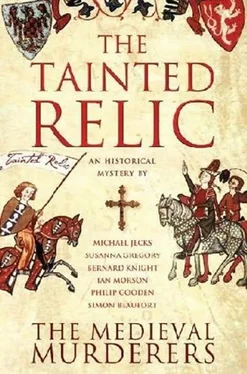Though mutilation, either cutting off a hand, castration or blinding, was a common penalty for serious assault or minor theft, murder or stealing anything worth more than twelve pence was a hanging offence, as was the capture of anyone previously outlawed. One of today’s felons was such an outlaw, another being a tanner who had beaten his wife’s lover to death on catching them in flagrante delicto and the third a boy of fifteen who had stolen a pewter jug worth twenty pence.
A small crowd had assembled to watch the proceedings, some of them relatives of the condemned, the others spectators who came regularly, regarding the executions as a form of entertainment. These were mainly old men, housewives and grandmothers, with a horde of toddlers and urchins running around them. A few pedlars and pie-men always attended, making a reasonable trade as the spectators waited for the show to begin. Even the town beggars and a couple of hooded lepers lingered on the edge of the crowd, rattling their bowls and crying for alms.
The gallows was a massive beam supported at either end by two tree trunks. Five rope nooses dangled from it and ladders were propped at both ends. There were a number of hangmen in Exeter, all part time, as they also followed other trades. Today a slaughterman from the Shambles was officiating; he favoured the use of an ox-cart, rather than pushing the victims off a ladder. Hands lashed behind them, the victims were stood together on a plank across the cart, directly underneath the gallows. The executioner climbed up, put a rope around each neck, then gave the ox a smart smack across the rump, though it was so used to the routine that it hardly needed such a signal. As it trundled forward, the three poor wretches were left hanging momentarily in space, their screams abruptly cut off as the strangling rope cut into their throats. Immediately, members of the families of two of the condemned rushed forward and dragged down violently on their legs to shorten their suffering, but the outlaw, who had no one to see him off, was left to kick and twitch for several minutes until death mercifully overtook him.
John watched the proceedings impassively, as violent and sudden death held no novelty for him, after more than twenty years on the battlefields of Ireland, France and the Holy Land. Thomas de Peyne was not made of such stern stuff and always turned his head away as the ox-cart began to move. As soon as the bodies had stopped dancing on their ropes, the crowd began to drift away, except for the wailing families, who lingered with their handcarts to claim the bodies for burial.
The coroner waited for his clerk to gather up his writing materials and stow them away in his shoulder bag, then began walking back towards the city walls. It was hardly worth saddling up his stallion Odin for such a short distance, and within a few minutes they were approaching Exeter’s massive South Gate, where they saw a large figure coming towards them with a familiar rolling gait.
‘Here’s Gwyn. What’s he want?’ demanded Thomas.
The usually phlegmatic Cornishman was agitated. ‘I’ve found a man who saw something in the Bush last night,’ he boomed. As they hurried back towards Idle Lane, the officer explained that he had managed to round up another dozen men who had been drinking in the tavern, and one of them remembered seeing a hooded man coming down the ladder late that night. ‘He says he wasn’t in a priest’s garb, but the hood was over his face and he had no cause to make any effort to recognize him.’
‘At least it lessens the threat against Nesta, if we have a new possibility,’ muttered John. ‘Have you kept this man at the Bush?’
‘They’re all there, Crowner. I told them they must wait until you came.’
The new witnesses were in the taproom when they arrived, taking advantage of the wait to drink more ale. John questioned the man Gwyn had found, but he was unable to add any more to his recollection that the hooded man had come down the steps and vanished out of the front door.
‘His robe was grey and dirty, Crowner. I can say no more about him than that he was tall.’
John questioned all the other men, but none of them had noticed the mysterious figure, and he became frustrated that there seemed no way of identifying the fellow.
‘He may have nothing to do with it,’ cautioned Thomas tentatively. ‘Perhaps he was one of the other lodgers from the loft.’
Nesta shook her head as she stood listening. ‘None of those travellers was particularly tall-and none wore a dirty grey robe,’ she said firmly.
John de Wolfe snarled again at the men, trying to force someone to remember more details, but they all shook their heads sadly, despite the fact that they would have liked to help both the coroner and his popular mistress.
Then suddenly there was a voice from behind him, a sing-song piping that came from a vacant-faced youth who had been squatting in a corner.
‘I know who he was! I begged him for a ha’penny for ale when he came out of the door.’
There was a sudden silence as everyone turned to look down at the ragged boy. Though not an idiot, he was ‘simple’, as the tolerant locals called him, a loose-lipped, runny-nosed lad with an abnormally big head. Nesta, who gave him spare food almost every day, crouched down beside him and spoke to him gently.
‘Peter, did you see his face? Who was he?’
The boy looked at her and then at the expectant men with an almost pitying expression.
‘Don’t you know? It was Simon Claver, him with the rotten nose that used to live in Smythen Street.’
At this, there was a babble of voices from the surrounding men, cut short by de Wolfe’s harsh voice.
‘Who in hell is Simon Claver?’ he demanded.
‘He was a smith, from just up the road here,’ answered the potman.
‘Simon beat up his brother-in-law more than a year ago, half killed him!’
There were murmurs of agreement from the others. ‘He escaped the hue and cry and secured sanctuary in Holy Trinity,’ continued old Edwin, who knew all the local scandals. ‘Then he abjured the realm, but ran away before he got ship at Topsham, so he was outlawed.’
The coroner looked across at Gwyn and nodded. ‘Sounds as if he could be our man-but where the hell do we look for him?’
De Wolfe’s desire to lay his hands on the killer of Gervase was multiplied a thousandfold by that evening, as while he was sitting at his cheerless supper table with Matilda, Gwyn arrived in a state of extreme agitation to report that the sheriff had arrested Nesta on suspicion of murder.
‘The bastard sent half a dozen men-at-arms to the Bush and they’ve dragged her off to Rougemont!’
Though Gwyn was unwelcome in the house because of his wife’s antipathy to what she called ‘Celtic savages’, the urgency of the situation made both him and his master careless of her antagonism.
‘There’s even talk of putting her to the ordeal of water,’ roared Gwyn angrily. This was a primitive test for guilt reserved for women, whereby they were thrown bound hand and foot into deep water. If they sank, they were innocent; if they floated, they were guilty and hanged. Men were forced to run barefoot over nine red-hot ploughshares or pick a stone from the bottom of a cask of boiling water-if burns developed, they were judged guilty.
John leapt up from the supper table, his stool crashing over behind him.
‘She can’t be put in those foul cells under the keep!’ he yelled. ‘Not with that evil pervert Stigand as her gaoler.’ He glared across at his wife. ‘Your damned brother is doing this out of sheer malice, Matilda! No woman should be kept in Rougemont at the mercy of that fat swine!’
Matilda looked back impassively at her husband for a long moment, and John wondered whether she was going to use this as a way of punishing him.
Читать дальше












